|
|
|
Sort Order |
|
|
|
Items / Page
|
|
|
|
|
|
|
| Srl | Item |
| 1 |
ID:
171219
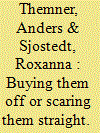

|
|
|
|
|
| Summary/Abstract |
Post–civil war democracies are characterized by intense electoral competition. To ensure continued political relevance, ex-military-turned-politicians, or “warlord democrats” (WDs), can either engage in a rhetoric of fear or ease societal tensions by employing a rhetoric of peace. WDs’ choice of rhetoric can have a profound impact on durable peace by altering societal discourses concerning the legitimacy of using violence. A key question is therefore: Why do some WDs employ a rhetoric of fear, and others a rhetoric of peace, when running for office? We argue that the choice of rhetoric is a function of the patrimonial endowments WDs possess; if WDs lack the resources and social networks needed to distribute patronage, they may instead use a rhetoric of fear to rally voters. To highlight the explanatory value of this proposition, we compare two Liberian WDs who ran for the Senate in 2005—Adolphus Dolo and Prince Johnson.
|
|
|
|
|
|
|
|
|
|
|
|
|
|
|
|
| 2 |
ID:
141642
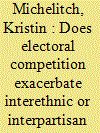

|
|
|
|
|
| Summary/Abstract |
Does political competition exacerbate economic discrimination between citizens on ethnic or partisan cleavages? Individuals often discriminate on group lines in ordinary economic activities, especially in low-income settings. Political competition, and thus mobilization of partisan and ethnic groups, waxes and wanes over the electoral cycle. This study therefore investigates discrimination over the electoral cycle in a commonplace yet consequential economic activity: market price bargaining. By conducting field experiments on taxi fare bargaining at three points in time around Ghana’s 2008 election, the research reveals that drivers accept lower prices from coethnics regardless of temporal proximity to the election. However, only at election time, drivers accept lower prices from copartisans and demand higher prices from noncopartisans. In sum, political competition affects commonplace economic transactions between citizens on the partisan cleavage. This study is the first to show evidence of interpartisan discrimination in everyday behavior and expands our knowledge of electoral cycle effects.
|
|
|
|
|
|
|
|
|
|
|
|
|
|
|
|
| 3 |
ID:
179769
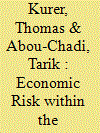

|
|
|
|
|
| Summary/Abstract |
This article investigates how unemployment risk within households affects voting for the radical right. The authors contribute to recent advances in the literature that have highlighted the role of economic threat for understanding the support of radical-right parties. In contrast to existing work, the authors do not treat voters as atomistic individuals; they instead investigate households as a crucial site of preference formation. Combining largescale labor market data with comparative survey data, they confirm the expectations of their theoretical framework by demonstrating that the effect of occupational unemployment risk on radical-right support is strongly conditioned by household-risk constellations. Voting for the radical right is a function not only of a voter’s own risk, but also of his or her partner’s risk. The article provides additional evidence on the extent to which these effects are gendered and on the mechanisms that link household risk and party choice. The results imply that much of the existing literature on individual risk exposure potentially underestimates its effect on political behavior due to the neglect of multiplier effects within households.
|
|
|
|
|
|
|
|
|
|
|
|
|
|
|
|
| 4 |
ID:
169770
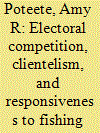

|
|
|
|
|
| Summary/Abstract |
Political clientelism is generally seen as an obstacle to democratic governance and inclusive development. The politics of access to Senegalese fisheries suggest a more nuanced relationship between elections, clientelism, responsiveness, and inclusion. Even where clientelism is pervasive, it takes different forms and interacts with electoral competition to influence the direction and form of political responsiveness. When elections are highly uncompetitive or when electoral turnover is highly likely, elections do little to constrain incumbents or discourage elite resource-grabbing. When electoral competition renders outcomes uncertain, however, politicians face incentives to court potentially influential blocks of voters with promises of decentralized clientelism. This article traces connections between the intensity of electoral competition and the politics of access to Senegalese coastal fisheries since the 1990s, focusing on the period before and after Senegal’s second electoral turnover in 2012. It argues that, while electoral competition may not reduce the prevalence of clientelism, it can influence whether national elites or ordinary voters are the main beneficiaries.
|
|
|
|
|
|
|
|
|
|
|
|
|
|
|
|
| 5 |
ID:
111609
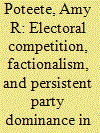

|
|
|
|
|
| Publication |
2012.
|
| Summary/Abstract |
The Botswana Democratic Party (BDP) has maintained a super-majority in the National Assembly for over forty years despite increasingly competitive elections. Several factors contribute to the BDP's continued legislative dominance, including features of the electoral system, fragmentation of the party system, and obstacles to strategic voting behaviour. Factional competition has played a particularly important role. Botswana's political institutions encourage factional competition, and factionalism interacts with the electoral system to hinder consolidation of the party system. Botswana's experience underlines the importance of internal party dynamics and their interaction with features of the electoral and party system in enabling the persistence of legislative dominance in competitive electoral systems.
|
|
|
|
|
|
|
|
|
|
|
|
|
|
|
|
| 6 |
ID:
160428
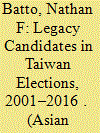

|
|
|
|
|
| Summary/Abstract |
Since inherited political resources may be inferior to personally accumulated resources, legacy candidates do best when facing mild competition, and shy away from intense competition. This is the first systematic empirical investigation of the extent of family politicians at both the national and local levels in Taiwan.
|
|
|
|
|
|
|
|
|
|
|
|
|
|
|
|
| 7 |
ID:
184759
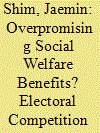

|
|
|
|
|
| Summary/Abstract |
Drawing insights from legislative, electoral and welfare studies, the article investigates whether and to what extent electoral competition affects incumbent politicians’ overpromising of social welfare benefits. For this, Taiwan is chosen as the case and the article examines the fate of elite-level social welfare legislative proposals in the period between 1992 and 2016. Findings drawn from quantitative bill sponsorship patterns demonstrate that political elites tend to propose failure-prone social welfare bills during election periods. Moreover, this tendency grew even more clearly in tandem with the rising levels of electoral democracy. The article argues that the overpromising of social welfare benefits is likely due to cognitive biases on the voter side allowing politicians to make promises without necessarily facing the negative consequences of under-delivery. The article contributes to the comparative welfare state literature by adding much-needed nuance to the existing debates on the relationship between democratic deepening, electoral competition, and the development of welfare politics.
|
|
|
|
|
|
|
|
|
|
|
|
|
|
|
|
| 8 |
ID:
119687


|
|
|
|
|
| Publication |
2013.
|
| Summary/Abstract |
What explains the surprising growth of work-family policies in several West European countries? Much research on the welfare state emphasizes its institutional stickiness and immunity to major change. Yet, over the past two decades, governments in Germany, the Netherlands, and the United Kingdom have introduced important reforms to their welfare regimes, enacting paid leave schemes, expanded rights to part-time work, and greater investments in child care. A comparison of these countries reveals a similar sequence of political and policy change. Faced with growing electoral instability and the decline of core constituencies, party leaders sought to attract dealigning voter groups, such as women. This led them to introduce feminizing reforms of their party structures and adopt policies to support mothers' employment. In all three cases, women working within the parties played an important role in hatching or lobbying for these reforms. After comparing three countries that moved in a path-shifting direction, this article engages in a brief traveling exercise, examining whether a similar set of dynamics are lacking in two countries-Austria and Italy-that have moved more slowly in reforming these policies. Against the prevailing scholarly literature that emphasizes path dependence and slow-moving change, this article reveals the continued power of electoral politics in shaping redistributive policies.
|
|
|
|
|
|
|
|
|
|
|
|
|
|
|
|
| 9 |
ID:
144930
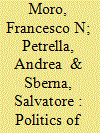

|
|
|
|
|
| Summary/Abstract |
Violence perpetrated by organized crime nowadays represents a major threat to state stability, both because it directly challenges political institutions, targeting officials and using terrorist techniques, and because severe inter-group conflict strongly affects human security. Though it is a distinctive feature of illegal markets and a constant strategy of Mafia-like groups, the occurrence of violence is localized in time and space. The article aims to explain temporal and spatial variation in Mafia killings focusing on its political determinants, as organized crime is deeply embedded in the political system. The analysis shows that there is a clear link between the structure of the political markets and the severity of violence. In particular, the fragmentation of the political market is negatively associated with the strategy of criminal groups to exploit violence. By contrast, single-party dominance and bipartisanship lead to an increase in homicides since these organizations have few opportunities to access the political arena. Outcomes are assessed through the analysis of monthly homicides reported by police forces in Italian provinces from 1983 to 2008.
|
|
|
|
|
|
|
|
|
|
|
|
|
|
|
|
| 10 |
ID:
145645
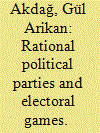

|
|
|
|
|
| Summary/Abstract |
Based on spatial modeling, this study introduces the Kurdish Opening policy of the AKP to resolve the Kurdish problem in Turkey as a rational strategy to increase its electoral support. On one hand, through the analysis of the effective numbers of parties, margins of victory in the Kurdish populated region and provinces it shows that the AKP and the pro-Kurdish parties are the main competitors among Kurdish voters, yet the competition the two parties face is not uniform across the provinces. On the other hand, shifts in Islamist vote and volatility rates indicate the presence of a large amount of religiously oriented ethnic voters who are sensitive to positional change especially in the provinces where the AKP is overrepresented in the parliament. More generally, the study confirms that the AKP's move on the Kurdish issue should be evaluated as a rational strategy that increases the number of potential swing voters for the party.
|
|
|
|
|
|
|
|
|
|
|
|
|
|
|
|
| 11 |
ID:
170811
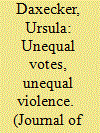

|
|
|
|
|
| Summary/Abstract |
Elections held outside of advanced, industrialized democracies can turn violent because elites use coercion to demobilize political opponents. The literature has established that closely contested elections are associated with more violence. I depart from this emphasis on competitiveness by highlighting how institutional biases in electoral systems, in particular uneven apportionment, affect incentives for violence. Malapportionment refers to a discrepancy between the share of legislative seats and the share of population, violating the ‘one person, one vote’ principle. Drawing on recent work on malapportionment establishing that overrepresented districts are targeted with clientelist strategies, are more homogenous, and are biased in favor of district-level incumbent parties, I argue that overrepresented districts present fewer incentives for using violence. In contrast, elites in well-apportioned or underrepresented districts exert less control over electoral outcomes because such districts have more heterogenous voter preferences, raising incumbent and opposition demands to employ violence. I examine the effects of malapportionment on violence using constituency-level elections data and new, disaggregated, and geocoded event data on the incidence of election violence in India. Results from six parliamentary elections from 1991 to 2009 show that electoral violence is less prevalent in overrepresented constituencies, and that violence increases in equally apportioned and moderately underrepresented districts. The analysis establishes additional observable implications of the argument for district voter homogeneity and incumbent victory, accounts for confounders such as urbanization and state-level partisanship, and validates measures of election violence. The findings illustrate that institutional biases shape incentives for electoral violence.
|
|
|
|
|
|
|
|
|
|
|
|
|
|
|
|
|
|
|
|
|